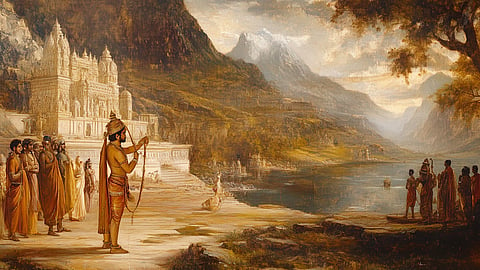- Commentary
- History Vignettes
- Notes on Culture
- Dispatches
- Podcasts
- Indian LanguagesIndian Languages
- Support

THE BELIEF THAT INDIANS have always had in omens and dreams is captured in the Rāmāyaṇa as well. Bharata, Trijaṭā, Mālyavān, and others have dreams, which are premonitions of future events. Trijaṭā, the kind rākṣasī observes that Sītā’s right eye is twitching and declares that she foresees the release of Sītā, the vanquishing of Rāvaṇa and the victory of Rāma.
Rewards
Returning a good deed and a favour, valuing relationships, and never compromising on the bigger dharma are recurring elements in the Rāmāyaṇa. Rāma keeps the promise he made to Sugrīva, but when the latter forgets to keep his word, Rāma even warns him through Lakṣmaṇa.When Hanūmān brings him good tidings about Sītā, Rāma wishes to gift him something; but since he has no material possessions, he offers him a warm hug – an intangible gift when nothing tangible is available. He even declares that his entire clan – the Raghuvaṃśa will always remain in Hanūmān’s debt.
The following verse brings out these facets in an elegant manner.
na ca saṅkucitaḥ panthā yena vālī hato gataḥ|
samaye tiṣṭha sugrīva! mā vāli-patham-anvagāḥ|| Kiṣkindhā-kāṇḍa, sarga 29, verse 48
Rāma cautions Sugrīva through Lakṣmaṇa, “The path through which Vālī has left the world is not closed yet. Keep your word, Sugrīva! Don’t go down Vālī’s path!”
The idea that Sugrīva will meet with death similar to Vālī’s is suggested through the verse; Rāma’s anger, i.e., the raudra-rasa-dhvani is evident as well.
Following refined etiquette is another hallmark of the Rāmāyaṇa. For instance, when his father summons him to the palace, Rāma rushes without a second thought, humbly announces his name and touches his father’s feet before beginning the conversation.
In another instance, before he enters an āśrama inhabited by ṛṣis, Rāma loosens his bow-string as it is not right to enter the abode of spiritual souls with weapons; moreover, there can be no danger from ṛṣis.
After killing Rāvaṇa and coronating Vibhīṣaṇa as the king of Laṅkā, Rāma wishes to see Sītā; he asks Hanūmān to convey his victory to Sītā, but then instructs him to seek Vibhīṣaṇa’s permission before entering the kingdom. Only a moment ago, Rāma himself had got Vibhīṣaṇa coronated by Lakṣmaṇa, and now, wishes to adhere to the rules set by the new king.
Rāma respects the territorial overlordship of kings and does not intend to disrupt them. In this background, it is also important to note that Rāma neither enters Kiṣkindhā nor Laṅkā, and asks Lakṣmaṇa to coronate the new king of both kingdoms. He adheres to the word given to his father even when he knows that his father has passed away – he had declared that he would remain in the forest for fourteen years, which meant that he would not step into any kingdom. Lakṣmaṇa, however, is not bound by this vow. Rāma knew the subtleties of dharma like none other. We must also note that Rāma never desired to conquer the kingdom of a defeated king. He only did his best to ensure that the particular kingdom was in the hands of a dharmic king.
The fulcrum of the epic lies in the bhikṣā that Sītā offers to Rāvaṇa who had come to her in disguise. We must keep in mind the emotional state that Sītā was in when the rākṣasa appeared before her. She had almost believed that her husband, Rāma was mortally wounded; she had chided her brother-in-law Lakṣmaṇa and sent him to look for her husband. She was certainly under immense mental agony when the fake parivrājaka appeared at her doorstep. Even in such a mental state, she recalled the duty of a gṛhiṇī – a noble wife. She has to offer bhikṣā to anyone who comes to her door and especially to saṃnyāsīs. She would have perhaps desisted from offering alms if anyone other than a saṃnyāsī had come to her doorstep under the current set of circumstances.
Rāvaṇa, who knew well the dhārmic nature of Rāma and Sītā, misused their goodness and deceived them. He perhaps knew that Sītā would never think twice before offering alms to a saṃnyāsī. This is among the first instances in the history of mankind where the spiritual āśrama of saṃnyāsa was misused for materialistic purposes. Rāvaṇa was perhaps among the first ones to cheat in the name of a saṃnyāsī.[1] This episode itself reflects the nature of a dhārmic gṛhiṇī and an adhārmic saṃnyāsī. This is also an instance which exemplifies the dhārmic deed of honouring guests in households.
The epic also reiterates on numerous occasions the qualities of a good friend, loyal servant, honest messenger, caring charioteer[1], valorous warrior, noble minister, and good citizen.
To be continued
The Dharma Dispatch is now available on Telegram! For original and insightful narratives on Indian Culture and History, subscribe to us on Telegram.
